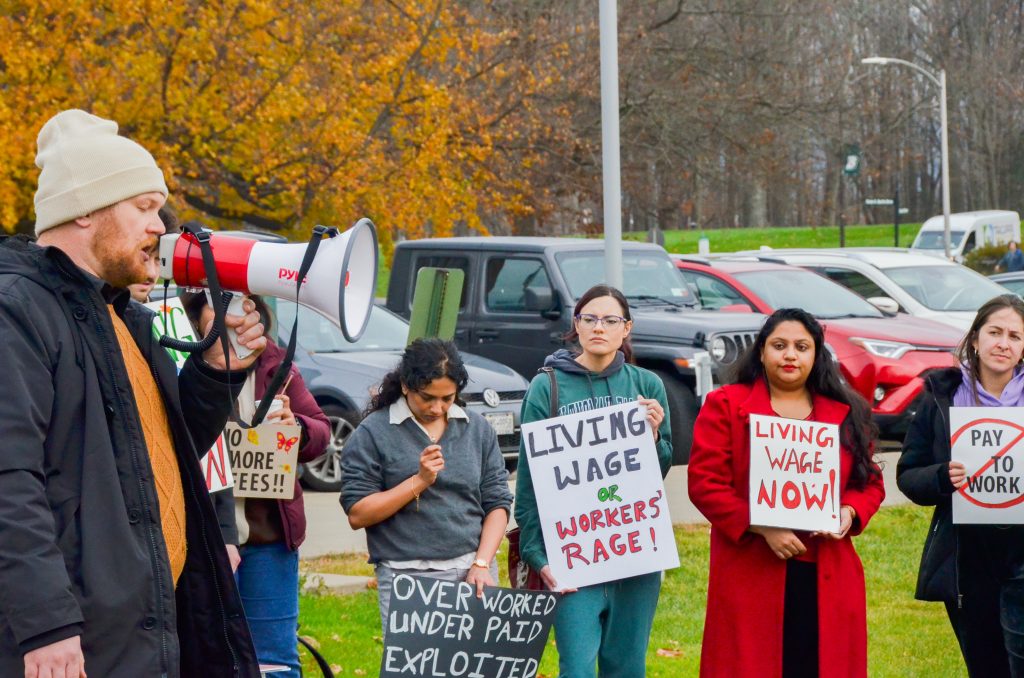Continuing their Living Wage Campaign, Binghamton University’s Graduate Student Employees Union (GSEU) rallied in front of the Couper Administration Building Friday, delivering a petition advocating for the elimination of fees that graduate workers have to pay to University President Harvey Stenger. No university officials received the petition, leading to GSEU hanging it and its over 1,100 signatures from the railing of the building’s staircase.
This year’s New York state budget was supposed to remove fees for all graduate workers, but master’s and international students have not yet been included in Stenger’s implementation of the legislation. At a recent Faculty Senate meeting, Stenger disclosed that the $12 million in state funding over four years will be the first step in a “phased approach” to eliminate fees for some master’s student workers. Still, according to Matt Midgett — a chief steward for GSEU and second-year Ph.D. candidate studying English — many workers will not meet the University’s criteria.
GSEU’s Living Wage Campaign is aimed at improving graduate workers’ recently expired contracts to increase their stipend to a livable wage. The Economic Policy Institute, a nonprofit think tank that researches how economic trends impact American trends, estimates a livable wage for one adult living in a studio apartment in Binghamton to be $36,261. The minimum annual stipend for doctoral students is $21,000.
Midgett explained the impact of the wages on graduate students and their families.
“By paying us poverty wages, the University forces members to decide between basic necessities, rather than allowing us to comfortably pay our bills, feed our families and conduct quality research and effective instruction,” Midgett wrote in an email. “As we are currently paid, members have no choice but to supplement their diet with food pantries, choose between paying rent on time or paying utility bills and search for additional income sources in order to provide for their families — which is extraordinarily hard to do given that the University restricts our ability to work a second job in many cases and for international students, in all cases.”
At the rally, Brendan McGovern, the United University Professions (UUP) president and program coordinator for geography, and Binghamton City Council member-elect Nate Hotchkiss stood in solidarity with the graduate workers.
Ryan Yarosh, the University’s senior director of media and public relations, said that if graduate workers were full-time employees, their scaled wages would range from $56,209 to $64,248. He described some efforts BU has taken to improve the well-being of its graduate employees.
“Over the past several years, the University has been working to improve wages for its academic student employees with competitive compensation and other benefits,” Yarosh wrote in an email. “For the past six years, the University has invested $2.3 million each year to increase Ph.D. stipends while adding $500,000 per year to support additional Provost Summer Fellowships. We will continue to look at this issue in the coming months.”
He added that for this academic year, graduate employees were contracted between Aug. 17, 2023 and May 22, 2024 and that with 780 working hours over nine months, their hourly wage came out to between $26.92 and $30.77.
“Even though graduate student employees are contractually obligated to spend no more than 20 hours a week on [teaching assistant or graduate assistant] duties, they should be paid the living wage of a full-time employee,” the GSEU wrote in last year’s living wage petition. “Combining TA [and] GA duties with the work coming from classes and research, graduate employees usually work 60-80 hours a week … it is time that the University remembered that graduate workers are the backbone of this institution and that without them, [BU] would soon be brought to its knees.”
Emily Rosman, a third-year Ph.D. candidate in the Translation Research and Instruction Program, stressed the impacts of low wages on graduate workers’ health and the educational quality provided to undergraduate students.
“I teach two classes, and I also dog-sit, and I edit part-time,” Rosman said. “I have four jobs to be able to afford to live here. [It] negatively affects mental health, and negatively affects physical health. [It] affects the students too because we don’t have as much time as we would want to dedicate to them because we’re all working other jobs.”
Other SUNY campuses, including the University at Albany and Stony Brook University, have removed international student fees due to the state budget’s funding allocation.
Shruti Jain, a chief steward for the GSEU and fourth-year Ph.D. candidate in the English department, said that international graduate workers still pay about $300 a year in fees to BU.
“A lot of the University’s diversity quota is fulfilled by our faces and our presence on campus — the work that we do — and it’s really strange that we as international students not only have to pay as much as other doctoral students do but more to do this free PR for our campus,” Jain said. “When we move here from another country, we have more expenses — extra expenses — we have to send back home, sometimes families to take care of. When we don’t get paid [enough], our lives are not livable.”
Editor’s Note (11/21): This article has been edited to change the state funding number to the correct amount, from $3 million to $12 million.



